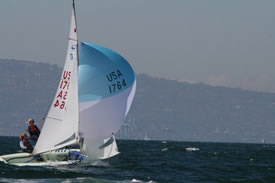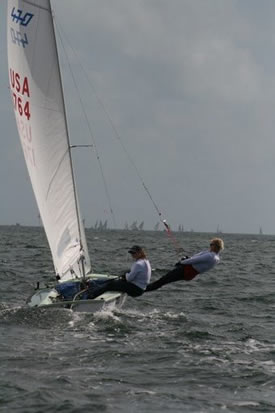
 |
| Lauren Sinclair and her sailing skipper Sara race in the Olympic Trials. (Photo Courtesy of Lauren Sinclair) |
By Rebecca Wyatt Thomas, OU Web Writer
When Lauren Sinclair, CAS ’07, was younger, she hated sailing and would do whatever she could to avoid it. Now, sailing is Sinclair’s life. After getting involved in the summer camp program at the Detroit Yacht Club, participating in sailing in college and participating in a number of regional, national and international races, Sinclair has her next course set — the 2012 Olympics.
“Never in my entire life did I think I could go this far in sailing,” Sinclair said. “When I was younger, I use to fake being sick in order to not go sailing, and 13 years later, I’m sailing in the Worlds.”
Sinclair came to OU from the University of South Florida. A Michigan native, Sinclair had hurt her shoulder and needed to return home for treatment. At her former school Sinclair was a member of the Division I varsity sailing team. Coming back to Michigan, she figured she wouldn’t sail in college anymore. After two years off, Sinclair joined OU’s sailing club and regained her passion.
“Living in San Diego now, I honestly respect growing up sailing on the Great Lakes much more,” Sinclair said. “My whole life, growing up, I always felt the California program had such an advantage over the Great Lakes programs, but in all honesty, I think it’s just a confidence thing. Michigan provides some of the best sailing there is. I feel I received a very good base training from my coaches and various other people who helped me out while growing up in Grosse Pointe.”
Sinclair sails on 470s, which are two-person single trapeze planning dinghies, with one other person serving as the skipper.
“I think I like having the collaborative effort. My whole life I have always liked other people’s input, and I think having two people on a boat works well for me. I’m a very social person; I’m also mildly indecisive so having that extra head really helps the boat go fast,” Sinclair said.
While Sinclair had been racing in college, races through her yacht club and even the Port Huron to Mackinac Race in Michigan, her first international race, the Rolex Miami Olympic Class Regatta in Coconut Grove, Fla., was her first international race and one of her biggest sailing memories.
 |
| Sinclair sails on 470s, which are two-person single trapeze planning dinghies, with one other person serving as the skipper. (Photo Courtesy of Lauren Sinclair) |
In July 2007, Sinclair represented the United States at the 2007 International Sailing Federation World Championships in Cascais, Portugal. She said sailing in Europe and sailing is much different than the United States. The sport is more popular and the sailors were treated like celebrities.
Prior to the World Championships, Sinclair was not only training for the competition, she was finishing her degree through an online class.
In October 2007, Sinclair participated in the 2008 Olympic trials. Sinclair and her skipper finished in fifth place and while it wasn’t enough to go to the Beijing summer games, it has sparked her desire to shoot for 2012 in London.
The trials were a new experience for Sinclair. Males and females raced together, the wind was light and her team was the youngest girls’ team by far.
“The whole trials were an exhausting process with eight full days of racing with only one rest day in between. I was happy to just get through the whole regatta. Overall, fifth in the country doesn’t seem too shabby to me,” Sinclair said.
Sinclair was also inspired by the words of a veteran sailor. Gary Jobson, a former Olympian and America’s Cup race and now NBC Sports commentator, approached Sinclair and her skipper and told them they had great potential.
Sinclair said there is one big obstacle for getting to the Olympics: Money. She said the average two-person boat spends close to $250,000 a year for equipment, travel costs and coach costs. Most of the money for her Olympic quest comes from her three main sponsors: SmartWater, Gul Sailing Gear and The Boathouse. She said once the money is secured, sailors start mapping out international regattas to sail in and then begin training.
For Sinclair, practice is limited to three-and-a-half hours of sailing. When training for the Olympics she sailed five days a week. When training in Germany, Sinclair and her skipper would be on the water by 11 a.m. and off by 4 p.m. It took a half-hour to sail out and a half-hour to sail in and they allowed themselves a 30 minute break. They would do an hour of upwind sailing, an hour of downwind sailing and a half-hour of reaches and then they would spend an hour practicing issues from the day before. Their coach, Marta Weores, a former Hungarian Olympic sailor and weather strategist for Team Shosholoza, helps them balance their training schedules and develop drills for them to practice.
On land, Sinclair swims five days a week, mostly due to asthma that limits her ability to run. In addition she works out in the gym on strength training and balance skills with lots of free weights, stability balls and Bosu balls, which she learned from Lisa Nelson, the personal trainer she had at OU’s Rec Center.
“One thing I have always struggled with in sailing is finding my confidence. I didn’t grow up at the best sailing club in Detroit, and now looking back on it, I’m happy I didn’t. If I hadn’t been where I was, I wouldn’t be where I am today,” Sinclair said. “Now that I am older and in the sailing world with the best of the best, I realize how fortunate I have been sticking with the sport. It is an extremely hard place for a woman to excel, and I’m proud that I have been one of the few.”
For now, Sinclair is taking some time off from the international sailing competition and enjoying life and sailing before jumping back into a rigorous training schedule for the 2012 Olympic trials. As an OU student, Sinclair studied abroad in London. She would like to go back, this time as part of the United States Olympic team.
 When Lauren Sinclair, CAS ’07, was younger, she hated sailing and would do whatever she could to avoid it. Now, sailing is Sinclair’s life. After getting involved in the summer camp program at the Detroit Yacht Club, participating in sailing in college and participating in a number of regional, national and international races, Sinclair has her next course set — the 2012 Olympics. Sinclair came to OU from the University of South Florida. A Michigan native, Sinclair had hurt her shoulder and needed to return home for treatment. At her former school Sinclair was a member of the Division I varsity sailing team. Coming back to Michigan, she figured she wouldn’t sail in college anymore. After two years off, Sinclair joined OU’s sailing club and regained her passion.
When Lauren Sinclair, CAS ’07, was younger, she hated sailing and would do whatever she could to avoid it. Now, sailing is Sinclair’s life. After getting involved in the summer camp program at the Detroit Yacht Club, participating in sailing in college and participating in a number of regional, national and international races, Sinclair has her next course set — the 2012 Olympics. Sinclair came to OU from the University of South Florida. A Michigan native, Sinclair had hurt her shoulder and needed to return home for treatment. At her former school Sinclair was a member of the Division I varsity sailing team. Coming back to Michigan, she figured she wouldn’t sail in college anymore. After two years off, Sinclair joined OU’s sailing club and regained her passion.